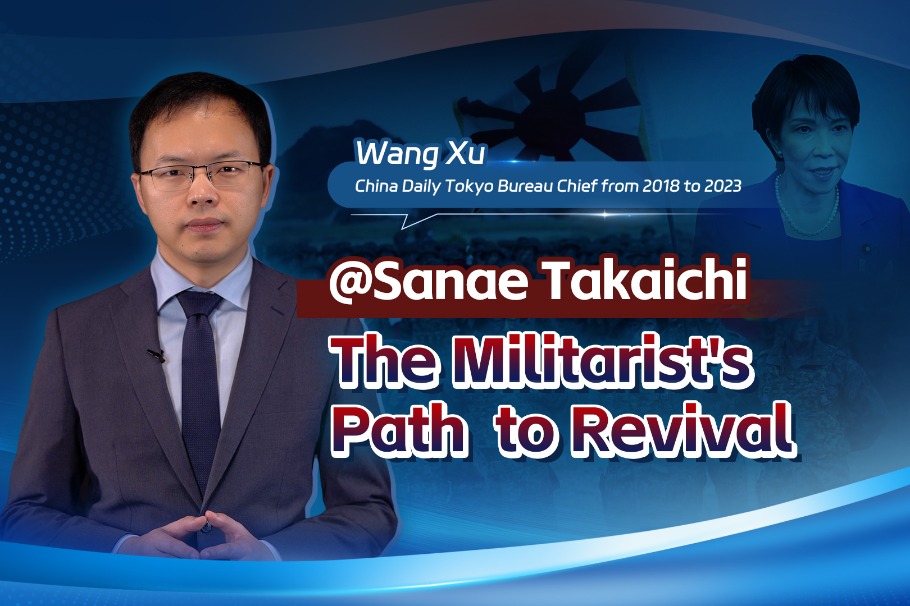Manchester University head seeks closer ties with Chinese academia

Duncan Ivison, president and vice-chancellor of The University of Manchester, recently completed a visit to Beijing, Shanghai and Hong Kong to connect with partners, alumni, and universities in China.
It was his first official overseas visit since assuming the role last August. His stops included Tsinghua University, Peking University, the China Scholarship Council, the Shanghai Jiao Tong University, Fudan University and the Asia Society Hong Kong Center.
"It's all about building those connections and creating good partnerships," Ivison said about his visit. For example, at Tsinghua University, where he met with the university's president Li Luming, discussions focused on developing further collaboration in fields like electrical engineering, chemistry, astronomy, health, and environmental sustainability. He also visited the Tsinghua University Art Museum to explore potential partnerships with the Manchester Museum.
During the visit to Peking University, Ivison met Gong Qihuang, the university's president, who praised The University of Manchester's remarkable research achievements in fields like atomic physics, artificial intelligence, and graphene materials. Gong expressed his eagerness for the two institutions to enhance exchange and collaboration on scientific research, interdisciplinary studies, sustainable development, as well as digital and intelligent education.
"It gives us opportunities to work with amazing researchers, connect with great students, provide opportunities for our students and staff to do really good work, have a really good sort of student experience, and diversify our revenue," he said, referring to UoM's collaboration with Chinese universities.
Qiu Xin, Party secretary of Fudan University, shares a similar perspective. He eagerly anticipates increased collaboration in areas like artificial intelligence, materials, the environment and biomedicine.
"This collaboration will foster research innovation and talent development, ultimately making significant contributions to global education and technological advancement," Qiu said.
At the Schwarzman College at Tsinghua University, Ivison gave students a speech titled "What Constitutes a Great 21th-century University?" to discuss topics such as the AI revolution, AI-enhanced learning and challenges facing universities.
"We're writing a new strategy at The University of Manchester this year. We're considering what kind of university we need to be by 2035. I would try out ideas on really smart students to see what they think," he said.
Ivison argued that a great 21st-century university must prioritize interdisciplinary research, and bring together diverse fields to address critical global issues like climate change and sustainability. The UoM excels in this regard, ranking second in the world in the Times Higher Education Impact Rankings for its outstanding contribution to multiple United Nations Sustainable Development Goals.
Ivison also highlighted the role of universities in navigating the challenges posed by AI, particularly in combating misinformation.
"So, universities have to be the institutions that focus on evidence, rigor, knowledge, critical thinking, and good communication skills — not taking shortcuts or attempting to misinform or deceive people. We need to be the source of trusted knowledge for society. We must be the source of rigorous reasoning, argument and evidence, rather than contributing to the shouting that often occurs in the public sphere. This is a truly important role," he emphasized, adding that universities should take the lead in researching and teaching related to trustworthy AI systems, to clarify their capabilities and limitations.
He also stressed the importance of universities fostering cultural competence as a key skill in preparing students for the future and says that cultural competence is defined as "the ability to understand and effectively engage across different cultures".
Ivison earned his bachelor's degree in political science and philosophy from McGill University in Montreal, Canada, and his master's degree and PhD from the London School of Economics and Political Science. Over the course of his career, he has held positions at the Australian National University, the University of York in the United Kingdom, the University of Toronto, and, notably, at the University of Sydney for more than 20 years.
"I think such experiences help me understand what someone else might be thinking, especially if they are different to me or have a different perspective," he said. "It tends to make you a bit more empathetic toward people."
As head of The University of Manchester, which has a diverse student body, 40 percent of whom are international, including around 10,000 Chinese, Ivison is determined to create a supportive environment for students from different backgrounds to forge connections with each other and with the university's leadership.
"I've tried to create an environment in which students feel they can ask me any question about anything," he said, adding that the university plans to develop programs to train students in managing difficult conversations, leadership skills, and effective chairing of meetings, especially targeted at enabling them to run inclusive societies.
"We are definitely committed to having a large proportion of international students," he said.
During his visit, Ivison attended alumni receptions in Beijing, Shanghai and Hong Kong, connecting with graduates in China.

Today's Top News
- Shanghai jumps to beat of electronic music festival
- Outcomes of COP30 show multilateralism is alive despite headwinds
- 'No room for compromise' on sovereignty, FM says
- Battery tech progress to power EV sector's future
- G20 called on to firmly uphold free trade
- China's well-being assistance crucial for many: China Daily editorial






























